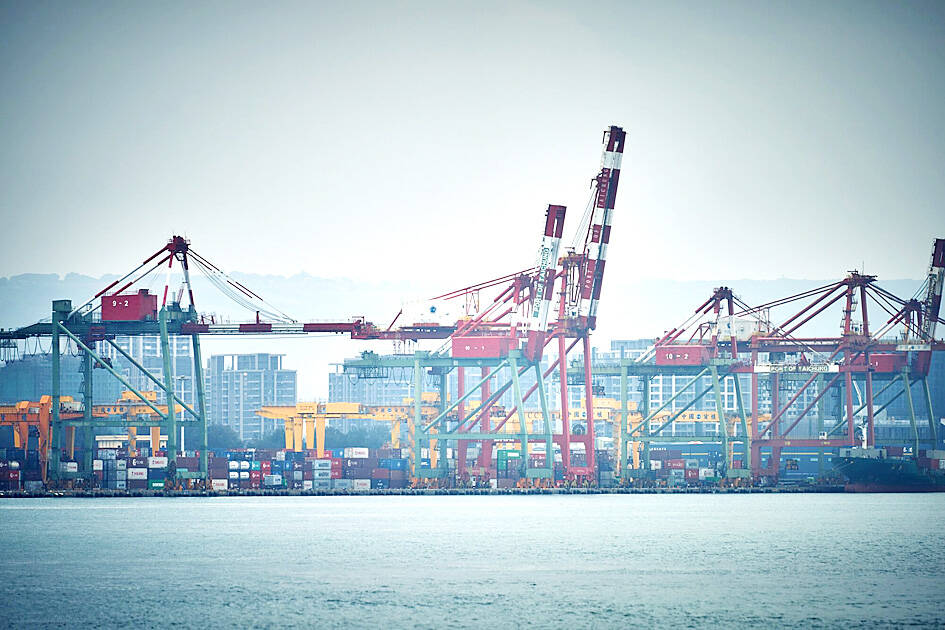Taiwan’s GDP is forecast to grow 4.36 percent year-on-year this year, as the economy is expected to benefit from rising exports and stable private investment, led by semiconductor companies and firms linked to the artificial intelligence (AI) boom, Yuanta Securities Investment Consulting Co (元大投顧) said on Friday.
The forecast represents a 0.67 percentage point increase from its previous estimate of 3.69 percent in March, Yuanta said in a report.
Major research institutes since April have raised their predictions for Taiwan’s economic growth this year, with the estimated growth ranging from 3 percent to 3.94 percent — higher than the average of 3.14 percent over the past 10 years.

Photo: Bloomberg
The Directorate-General of Budget, Accounting and Statistics (DGBAS) late last month also lifted its GDP growth forecast for this year from 3.43 percent to 3.94 percent, exceeding the annual growth target of 3.5 percent set by the National Development Council.
Yuanta’s upward revision came after GDP in the first quarter of the year increased by 6.56 percent from a year earlier — an 11-quarter high — beating its March prediction by 0.6 percentage points, the report said.
It also came as the world’s economy is projected to grow steadily this year, with global trade in goods expected to expand by 2.3 to 3.2 percent year-on-year this year, compared with an increase of 0.1 to 1 percent last year — which would help boost Taiwan’s exports, it said.
Taiwan’s exports expanded 9.1 percent year-on-year during the first five months of this year, higher than the average growth of 3.9 percent for the same period over the past 10 years and indicating strong momentum in external demand, the report said.
Local manufacturers are also to complete their inventory adjustments in the next few months, which would boost firms’ capacity utilization and contribute to shipment growth, it said.
Moreover, Taiwan’s export structure is also improving, as outbound shipments of electronic products increased nearly 20 percent in the first five months, becoming a major pillar of the economy, and the decline in non-electronic exports shrank significantly, reducing its drag on overall exports, the report said.
As a result, Yuanta upgraded its Taiwan export growth forecast by 2.33 percentage points to 8.51 percent this year, compared with the DGBAS’ 10.06 percent growth forecast.
Yuanta also raised its growth estimates for private consumption and private investment by 0.2 percentage points and 1.32 percentage points to 3.22 percent and 3.31 percent respectively. In comparison, the DGBAS last month upgraded its growth estimates to 2.77 percent for private consumption and 1.52 percent for private investment this year.
The consumer price index is projected to rise by 2.22 percent this year, 0.04 percentage points faster than the March forecast, after taking into account recent electricity rate hikes and the stickiness of inflation in the services industry, Yuanta said.
Yuanta’s inflation projection is above the central bank’s 2 percent target for the third consecutive year, warranting further interest rate hikes by the monetary authority in the future, it said.
The central bank early this month kept its policy rates unchanged, but further adjusted the selective credit control measures and raised the reserve requirement ratio by 0.25 percentage points to cool the property market and tighten liquidity.

Zhang Yazhou was sitting in the passenger seat of her Tesla Model 3 when she said she heard her father’s panicked voice: The brakes do not work. Approaching a red light, her father swerved around two cars before plowing into a sport utility vehicle and a sedan, and crashing into a large concrete barrier. Stunned, Zhang gazed at the deflating airbag in front of her. She could never have imagined what was to come: Tesla Inc sued her for defamation for complaining publicly about the vehicles brakes — and won. A Chinese court ordered Zhang to pay more than US$23,000 in

Taiwan Semiconductor Manufacturing Co (TSMC, 台積電) yesterday said that its investment plan in Arizona is going according to schedule, following a local media report claiming that the company is planning to break ground on its third wafer fab in the US in June. In a statement, TSMC said it does not comment on market speculation, but that its investments in Arizona are proceeding well. TSMC is investing more than US$65 billion in Arizona to build three advanced wafer fabs. The first one has started production using the 4-nanometer (nm) process, while the second one would start mass production using the

‘NO DISRUPTION’: A US trade association said that it was ready to work with the US administration to streamline the program’s requirements and achieve shared goals The White House is seeking to renegotiate US CHIPS and Science Act awards and has signaled delays to some upcoming semiconductor disbursements, two sources familiar with the matter told reporters. The people, along with a third source, said that the new US administration is reviewing the projects awarded under the 2022 law, meant to boost US domestic semiconductor output with US$39 billion in subsidies. Washington plans to renegotiate some of the deals after assessing and changing current requirements, the sources said. The extent of the possible changes and how they would affect agreements already finalized was not immediately clear. It was not known

A TAIWAN DEAL: TSMC is in early talks to fully operate Intel’s US semiconductor factories in a deal first raised by Trump officials, but Intel’s interest is uncertain Broadcom Inc has had informal talks with its advisers about making a bid for Intel Corp’s chip-design and marketing business, the Wall Street Journal reported, citing people familiar with the matter. Nothing has been submitted to Intel and Broadcom could decide not to pursue a deal, according to the Journal. Bloomberg News earlier reported that Taiwan Semiconductor Manufacturing Co (TSMC, 台積電) is in early talks for a controlling stake in Intel’s factories at the request of officials at US President Donald Trump’s administration, as the president looks to boost US manufacturing and maintain the country’s leadership in critical technologies. Trump officials raised the